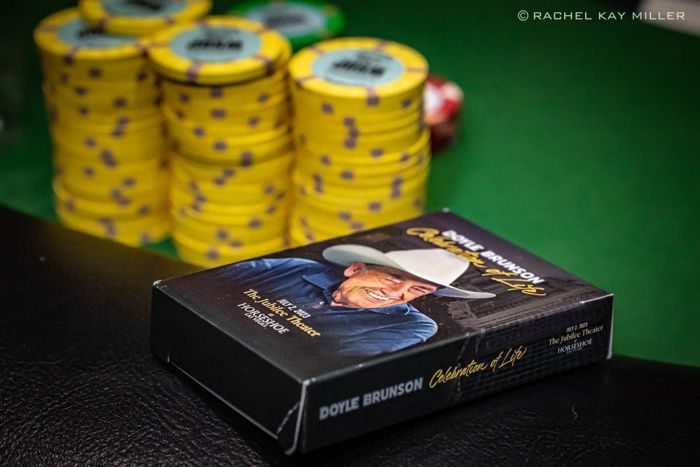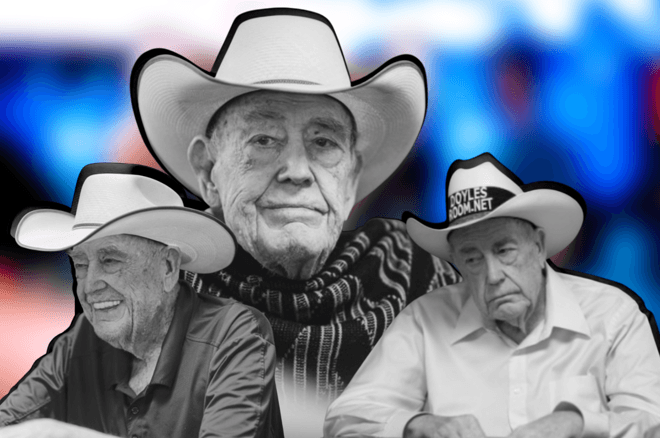When Doyle Brunson passed away at the age of 89 on May 14, 2023, the poker community lost its most iconic figure. Brunson, known to all as the Godfather of Poker, was there in the 1960s and 1970s when poker was a road gambler activity confined to underground Texas card rooms, and he was among those who moved west to play the earliest poker games in Las Vegas. Brunson saw the World Series of Poker take shape at Binon’s Horseshoe in downtown Vegas and was there as it moved to the Rio All-Suite Hotel & Casino in the mid-2000s. Brunson even lived to witness the most recent iteration of the WSOP as it moved on-Strip and revamped the Horseshoe brand in 2022.
It would be difficult to overstate Brunson’s impact on the poker world. Every poker player who was lucky enough to play with the legendary Doyle Brunson remember doing so, from old-school players like Billy Baxter and Steve Zolotow to a younger generation of players that included Tom Dwan and David Williams. Whether it was at a WSOP Final Table, under the cameras of a televised cash game or inside the legendary Bobby’s Room (now the Legends Room) at Bellagio, sitting down with Texas Dolly is a memory few players are likely to forget.
During and shortly after the 2023 WSOP, PokerNews interviewed 13 players who knew and played with Brunson to learn about the impact he had on their lives, playing styles and poker careers. From countless heads-up Chinese sessions to his last WSOP Main Event final table appearance in 1983, from reminiscing about Texas backroom games to paying $4,000 in a bet involving an illegal golf club, here are the memories those players have with the late Poker Godfather.
A Look at Doyle Brunson Through the Lens
What Is Your First Memory With Doyle Brunson?
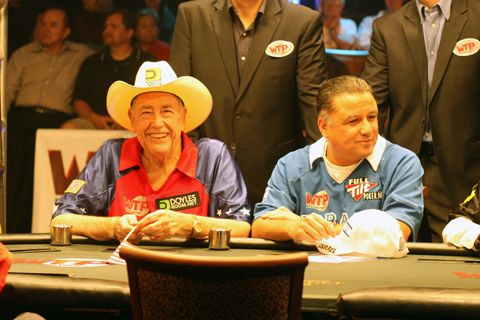
Eli Elezra (Poker Hall of Famer; longtime friend of Doyle Brunson): The very first time we were playing was, I started playing high limit at The Mirage, and we were playing $500/$1,000 to start. And I remember that when we played at the Mirage, Bobby Baldwin came and said that all the high limit was moving to Bellagio. And I loved the Mirage because I won my WPT (World Poker Tour) over there. And they made us move all the high limit to Bellagio. Bellagio opened a week later, I started playing the $1,000/$2,000, and it was with Doyle and Chip (Reese). That was the very first time. And it was obviously, it was like playing with God back then. We all knew that Doyle wrote the books and that Doyle is poker, basically. The Godfather. So for me it was, wow. I will tell you that I was I think 40, like 25 years ago, and that was the very first time playing with the best of the world. And it was kind of tickling. I was the businessman, I was basically the game, if you call it like that, because all of a sudden you’re a businessman that’s playing $1,000/$2,000 with them.
Billy Baxter (Poker Hall of Famer): When I first came out here in 1975, it was the Dunes where the Bellagio is now. And I never had played 2-7 in my life. But I had done pretty good in life before I came out here, so I had a few bucks. And they’re playing this lowball game over there, 2-7 no-limit. And there’s two old guys in the game, about 70-something years old. But they were playing really high. We were playing $500 ante, $1,000/$2,000 blinds, no cap, in the ’70s. And just to tell you how big it was, the last game we ever played before Major (Riddle) died, he lost $1.6 million in one game. And they built the first tower at Caesars for $16 million. So that’ll tell you how much money that was. The whole first tower! So anyway, millions were not like these days today. Back then, millions were millions. Now, they’re like, shoot, everybody’s got plenty of those, you know? They talk billions now. But anyway, they’re playing, and Doyle was in that game. So I said, surely I can (play). Because I was a pretty good card player, but I didn’t know about 2-7. So I started playing with them, and it didn’t take me too long to realize the competition wasn’t that good. And so I played it from there on. The first year I was here (at the World Series), I won the 2-7 tournament, and then the second year I was here I came second, and the third year I won it again. And the year I lost it, Bobby Baldwin beat me in the final. So I came first, second and first the first three years I was in town. And Doyle was in that game. And we played the $500 ante $1,000/$2,000 blind game every day It was a big game. You asked me where I met Doyle first, that was it.
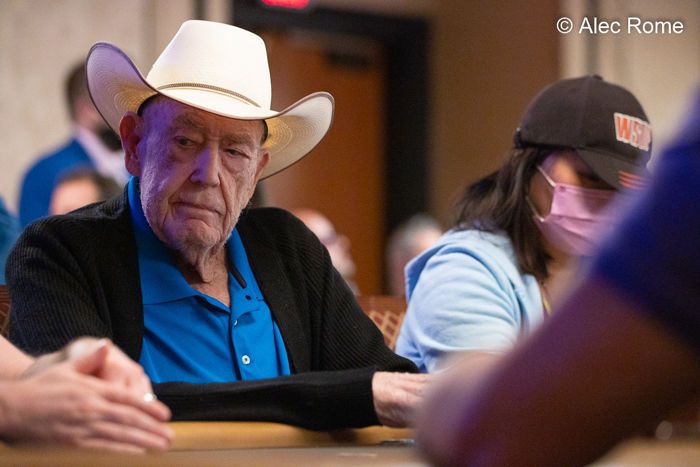
Tom McEvoy (1983 Main Event Champion): December 1, 1978. I was testing the poker waters here and I flew back and forth from my hometown of Grand Rapids, Michigan for a whole year starting in early 1978, like May 1978, I was making regular trips here (to Las Vegas) to see if this was something that might work for me, being a professional poker player. So I hear about this fabulous new book that Mr. Brunson came out with. I knew I had to have it. And I said, well, I’m not sure where to go to find it. And I found out he had a publishing company. And he didn’t have it for very long, this publishing company, it didn’t work out for him I guess overall. But he started out self-publishing this book (Super/System), I had to have it. This is December 1, 1978, and the reason I know that is because when I tracked down where the company was, which was on Industrial Road, I said, well, I’m going to have to go there and get this book.
So I go there, the place was empty except for one person: the man himself. Of course, I had never met him before, but I recognized him immediately. So I go there and gave him a hundred bucks and said, “I’d like to buy your book.” And he’s very gracious and he always inscribes it “To Tom” or to whoever purchased the book, “May all your deals be good ones.” That’s a standard thing he signed for most people. So I’m about five, six feet away from him, and I was sitting down in a chair while he was signing the book. And then I did something that was a little out of character for me, but I did it, and not in a mean way. I pointed my finger at him and kind of shook it at him, and, don’t forget, I’m not in his face, and I said, “One of these days I’m going to be at the same table as you. You wait and see.” And he just laughed, I’m sure he’s heard that a million times. Well, four years later I’m at the final table of the Main Event, and so was he.
David Williams (WSOP bracelet winner; 2004 Main Event runner-up): It was definitely at a WPT in 2005. Because I knew Doyle. So I’m from Texas, and I started playing when I was 19, 20, and poker wasn’t very popular then yet. And there were underground card rooms in Dallas that I played in. And he was a legend then because he was kind of the pioneer. He did what I was doing, traveling to the private games. And the place I started really playing at was called the Redman’s Lounge. And it was like a men’s club but it was a private underground poker club with like six tables. And it had a lot of pictures of the old cowboy gamblers on the wall because it was started by a guy named Cowboy Wolford. So they were all friends with Doyle and all these old rounders you hear about, Puggy (Pearson) and Amarillo (Slim), all these guys, they were playing there. So I’d heard about them and I’d heard about Doyle. So when I first, once I got second in the Main Event, came out to Vegas and started playing the tournaments, I introduced myself to Doyle at the Bellagio and explained to him that I knew a lot of the guys. I knew Cowboy’s brother and a couple of the other bookies from the card room who were friends with Doyle. I said, “Hey, I’m from Dallas. I play with all these guys,” and I dropped all these names. And he’s like “Oh, that’s the one place, the one club in the world where I’m not a winner.” He goes, “I never beat that joint,” and then we were friends from then on because both being Texans and traveling that kind of circuit.
But I think we first played together in a WPT. I don’t remember which one, but we sat side by side. I do remember that. And we just talked a lot about people we knew in common. And we were friends, you know, and he was kind of like a legend to me, obviously, growing up, outside of just what now the public knew. Just from being around the Texas card rooms. So getting to get to know him, he was just so approachable and nice. He was just like a Texan, very friendly. So it was cool, I was very honored that he kind of knew who I was, and we became buds. So I liked that. It’s a cool feeling.
Tom Dwan (Longtime high-stakes pro): I think the first time we played was in Bobby’s Room. I definitely remember some of the first times being early in Bobby’s Room. And you know, when I was first starting to play live in Bellagio, it was right when a bunch of people started to move from online to live. So it was definitely a bit of an experience playing with Doyle. He was just so known by everyone in poker and stuff.
Ben Lamb (Two-time bracelet winner; 2011 WSOP POY): We were playing $1k/$2k limit in Bobby’s Room. I was not the best limit player, but there were a couple spots in there. And I remember Single Draw was one of the games and he bluffed me in a big Single Draw pot. Or I don’t know exactly what happened in the hand, I mean it was 15 years ago, but he owned me in a Single Draw hand. But yeah, I definitely remember. There’s only two people I remember the first hands I played with: him and (Phil) Ivey.
Ted Forrest (Six-time bracelet winner): I played with him for years but I can’t remember the first time. I probably first played with Doyle at the Mirage and then mainly at Bellagio.
Mori Eskandani (Poker Hall of Famer; High Stakes Poker producer: The first time I played with Doyle was at the Mirage. We played $200/$400 half Stud, half Hold’em. And he got into the game, he didn’t know many of us, and after 20 minutes he said, “This game is not worth anything,” and he got up and left. But we were so, all of us were like, ah, he actually sat in the game! That small, even those days. It was I want to say 1991 maybe. The Mirage had been open a couple of years, that was the first time. But the first time I saw him, the first time I was a railbird, he was playing no-limit Hold’em. I remember him taking a really bad runner-runner beat when he flopped a set.
Mike Matusow (Four-time bracelet winner): I remember the first time I met him. He was playing in the Big Game, and I was crushing. Not beating, but crushing. The $100/$200, $200/$400 mixed games. I had just learned how to play Omaha 8 and Stud 8. I was a new kid on the block. And he came up to me and he said, “Kid, let me tell you something.” And I looked up to him, right? He goes, “You gotta play high enough to where when you lose, you feel it. If you’re not feeling it when you lose, you ain’t playing high enough.” I’m crushing this game. Alright, let’s play $400/$800. And I went broke. And I said, “This motherfucker. Did he get me to fucking play this high to bust me?” It was the first time I went broke. And the thing I look at, he was right. You can’t play poker to where (when) you lose, you don’t feel it. And I lived my life on edge like that until 2016, two years after my injury, because it came to a point where I’ve got to play smaller, I can’t go broke because I can’t travel the world, I can’t move, you know what I’m sayin’? But Doyle had a lot of respect for me. He told everyone I was the best Omaha 8 or Better player he’s ever seen. And I was.
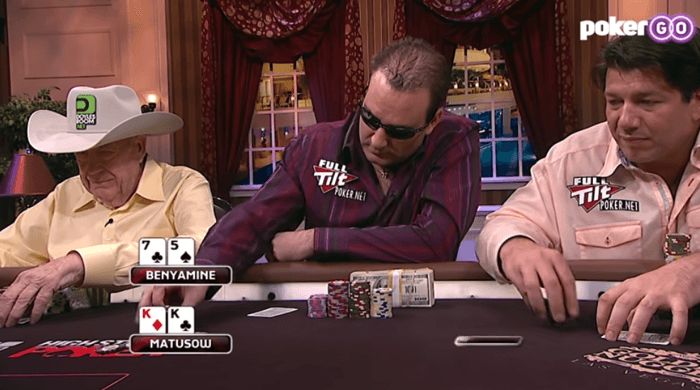
Andy Bloch (Bracelet winner; played with Brunson in 2006 $50,000 H.O.R.S.E. Championship): It probably wasn’t the first time, but the first time I can remember was in Tunica at the World Poker Open in 2002. And I remember I had just smooth-called with a pair of queens when a pair of jacks open-raised and the flop was queen-jack-something. We both slow-played the flop, we got it all in I think on the turn. And Doyle, to the guy who had jacks, was like, “Hey, you could have laid that down.” It’s not like the most amazing read, of course, you’re going to assume with that betting that somebody has the nuts, but it was certainly (memorable).
I can’t say that I wasn’t starstruck, at least in the beginning, when he sat down. But when you sit down at the poker table, you’ve got to just say, hey this is just like any other game. You might have the world’s best poker players there, and you might be worried that you’re giving off tells or you’re betting patterns are going to give away your hand. While you’re in a hand with them, you can’t be thinking about that. When you’re playing Doyle Brunson, you don’t want to assume he has ten-deuce. You also don’t want to assume that he can read your soul, although sometimes it seems like he can.
How Often Did You Play With Brunson?
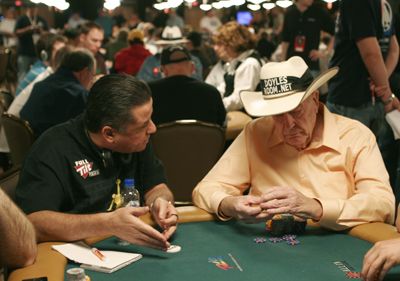
Eli Elezra: We played so many times. We played three or four times a week. I will tell you that I must’ve had thousands of hours together with Doyle and Chip, you know. And I flew with them a few times, we flew to the East Coast, we flew to Foxwoods, we took private jets and we became friends. Doyle started inviting me and Chip to the house at Christmas and if there was any special occasion there, we were together. At the beginning, it was mostly like business. But then later on, we started, I learned so much from those guys, from him and Chip. Doyle will always stay my idol, you know, in the eyes of why did I become a poker player. I think there was about a two-year period that I played three-handed, four-handed, me and Chip and Doyle, and I remember that Chip was so good and Doyle got to the point when he started to be like 68, 70, 72, and you can see some holes in his games. And I remember Chip calling me and telling me “Let’s get Doyle over here. Let’s get Doyle.” So we used to play many three-handed games for so many sessions. But still, I learned so much from him, how he’d try to take you off, and how he tried to take you off balance.
Tom McEvoy: I played often with him over the years, both tournaments and a few cash games early on. I even did a seminar with him once right after I won the World Series. I did a seminar with Doyle, Mike Caro and David Sklansky just a month or two after I had won (the 1983 Main Event).
Andy Bloch: I don’t know if I’ve ever played a cash game with him. I didn’t really play those nosebleed stakes. Like $400/$800 limit games and stuff. But it was a like a couple years where I ended up being at a lot of different tables with him and knocked him out a few times.
Steve Zolotow (Two-time bracelet winner; defeated Brunson heads-up in 1995 WSOP Chinese Poker event): I played him heads-up from like two in the morning until five or six in the morning for one of the only Chinese poker bracelets that they ever gave. And I beat him at like six in the morning.
Eli Elezra: I would say I had at least 30-40 sessions of playing Chinese with him for at least five or six hours heads-up.
Tom Dwan: I played with him a bit in PLO and no-limit, a little bit in mixed games and limit and stuff.
David Williams: We didn’t really play a lot together, (only) if we ran across (each other) in tournaments. I never played in the cash games he played in and he didn’t play in the games I played in.
Ben Lamb: Not a lot. Probably 50 times over the years I played cash with him. Not as much as some of the guys like Gordo (Mike Gorodinsky) and those guys.
Dan Shak (Longtime high-stakes player): It was like 20-something years ago. It was mostly in cash games back in the day.
Fake Heart Attacks, Salad Police & Old Groovy
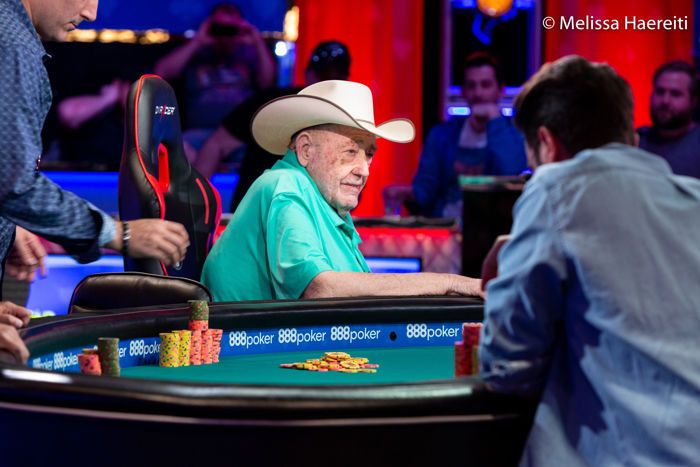
Ben Lamb: He had this sand wedge, this lob wedge that someone had taken a tool to the grooves and made it much sharper so it got a bunch of spin. Obviously an illegal golf club. But back then a lot of the guys I played with played with similar golf clubs, and it was just allowed. Obviously, you had to say, “Hey, I’ve got this thing,” you couldn’t just go play another game. But anyway, he had this wedge called Old Groovy, and I wanted the wedge. And I said, “Doyle, you play golf anymore?” “No, I’m too old, I can’t play anymore.” I said, “I’ll give Old Groovy a good home, can I get that from you?” He said “Sure, I’ll give it to you.” And I threw him three black chips and he said, “No, you don’t have to pay for it; it’s free.” I said, “No, no. Keep the three black chips, bring me the wedge tomorrow, because we were playing the next day, and if you forget it, you owe me a hundred bucks and every time I see you and you don’t have it, you owe me a hundred bucks.” Well, he just kept forgetting it, kept forgetting it. I bet he paid me $4,000 a hundred at a time. I’d be at dinner at the Bellagio with my wife and I would walk into the poker room just to collect my hundred dollars and see the pain on his face. And he couldn’t find it. I think he lost it. He gave me some old putters and some other stuff that I still have and I’ll keep forever, but Old Groovy was gone. I finally let him buy out, I think.
Billy Baxter: Doyle and I were in the bookmaking business, we were partners. I could fill your ears up about Doyle Brunson stories.
Steve Zolotow: When I was first coming there (to the World Series), I knew Doyle. And I don’t think we were playing in the same games yet. But we had friends in common. You know, Chip played backgammon, too, and I was a backgammon player. And I played in some tournament. At first they had a buffet that was open 24 hours, then they changed it to a buffet that closed at 10:30. So I get knocked out of the tournament at 10, I go running up to the buffet, and I’m pretty vegetarian. And I go in, and it’s full of people eating, all the food is still out, and the woman says, “We’re closed.” I said, “What do you mean you’re closed? Food is out.” I said, “All I’m going to do is just get a salad, sit down and eat it quickly.” And she said, “I’m telling you, it’s closed.” So I went in, got a plate, got a salad, and I can see her on the phone. So now they call up two huge security guards. So the security guards come in to grab me and I run out the back way down an escalator or stairs or something. And I go into the high limit area and I see Doyle playing. And I know Doyle knows everybody there. So I said, “Doyle, the salad police are after me. Can you rescue me?” And he said, “He’s OK.” And the guy started laughing when I called him the salad police. It was a lot of fun.
Another story. I’m not sure, I think it was Doyle, but it might have been Chip, at one point, probably (Johnny) Chan, Chip and Doyle were the best three high-limit players. And there had been some live one in town and he had gone broke and he had left. And I had played a little bit while the live one was there. Now he’s gone, and the three of them start playing the next day. And I said, “What are you crazy? The three best players in the world would want to play each other?” And he turned to me and he said, “If you don’t open the store, how are you going to get customers?”
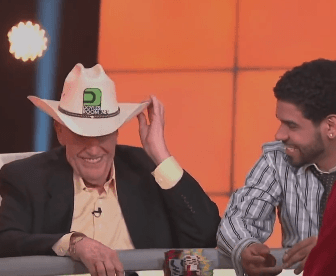
David Williams: It was cool telling stories about what had changed traveling through all those (Texas underground) games. He was asking me what it was like in the late ’90s because he hadn’t been there in many years. And I was telling him about some of the clubs I played in and he was like, “Oh, that place is still around?” or “How’s that guy doing?” or “How’s this bookie doing?” And I would go, “Oh, he died.” Just catching up like that was really cool to kind of have that link, even though we were so many generations apart. Not a lot of the guys who met him in Vegas had that. So that was cool. He’s a good people person. He’s so friendly, but he also can read people. He could get in people’s minds and know what they’re thinking, knew when to pick people off, knew who he could bluff. And that just comes from empathy, and I think he had a lot of it. He was just very personable. Always smiling and talking to you, but getting to know people. And when you truly get to know people, it actually helps you at the poker table.
Andy Bloch: I ended up getting sat next to him several times. It was always a great experience and an honor to be able to play with him. He was almost always in like a good mood, very friendly. Very sharp, almost at the top of his game even though he was getting older. And I think that was one of the things that hurt him for the $50,000 H.O.R.S.E (where Bloch finished second for $1,029,600 and Brunson finished seventh for $274,560). I think he ended up being one of the chip leaders going into the final day, but the schedule was squeezed into three days. And on Day 2 they wanted to get down to the final nine and we ended up playing until like six or eight a.m. or nine a.m. or 10 a.m. or something ridiculous like this. And it was super cold at the Rio, and it definitely made it hard for everybody for the next day. Even though we came back in the evening, nobody got a goodnight’s sleep. Well, nobody slept at night. Some people weren’t able to sleep during the day. So I think that gave me an advantage, being one of the younger people at the table.
I remember going to a New Year’s party that he was at and he kept having people come up and do shots with him. And then someone had to drive him home. I would not want to bet against Doyle in anything, whether it’s golf or poker or doing shots of tequila. He was a lot of fun. I don’t have a lot of social memories with him outside of poker, but there are a couple. He was the greatest at that, too.
Mike Matusow: We had a Halloween party every year. I’d go over there with Todd (Brunson). And they’re (Brunson’s family) just really nice. They were very nice people. I wasn’t close to them. I’m good friends with Todd because we played together, but I never really played in the Big Game with Doyle because when the banker from Texas came and they all got rich, that was the only weekend I was out of town. So everybody got rich and was playing $2,000/$4,000, $4,000/$8,000. That’s the only weekend I left town, you know? But who knows what would’ve happened.
Ted Forrest: Some player, I can’t remember who it was, but was making a pretty good argument for why he should be in the Hall of Fame during the year that Todd was nominated. And Doyle looks him straight in the face and says, “You know, you’re right. You should get the vote. But family’s family.”
Eli Elezra: After Doyle got to know me very good, he came one day to Bobby’s Room, he gave me his book, and he said, “That’s for you.” So I opened the book and I see he wrote something like “For my friend Eli” — I still have this book — “I don’t suggest you read this book. It’s going to ruin your game.” So I mean, that’s how close we were that he knows that I have a different game than him. But of course we’re talking about Doyle here. Definitely, I learned so much from him.
Tom Dwan: Him and Baldwin had a lot of crazy stories, and so sometimes when both of them were at the table (they would talk about them). Because I know Bobby better than I knew Doyle. So sometimes I’d hear some of the old back-in-the-day stories. Did you hear that he faked a heart attack three times? People tried to follow him home and rob him or something, and I don’t remember exactly, I think it was at least twice, it might have been three times, that he faked a heart attack. He told it while I was at the table a few times.
Jennifer Harman (Poker Hall of Famer; longtime friend of Brunson): When we were at the poker table we were fierce competitors, when we weren’t he was like a marshmallow puppy dog to me. Hugs from Doyle were amazing.
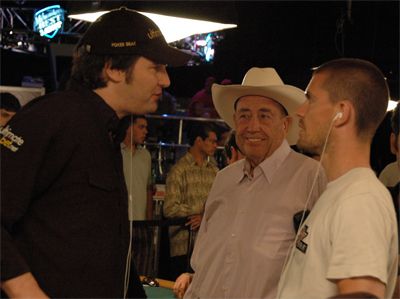
Tom McEvoy: Phil Hellmuth pisses people off. I’m friends with Phil and I like Phil, but his ego is just sometimes out of control. He’s abusive at times to players at the table. And then he apologizes and tries to correct it, but he still shoots his mouth off and says things he shouldn’t say. Doyle was not like that. Doyle was always pretty much a gentleman at the table. And (Daniel) Negreanu is a great spokesman for the game, too. But he’s also somewhat controversial and he shoots his mouth off sometimes and says some things that are controversial and I don’t agree with. But Doyle wasn’t, I wouldn’t say he was controversial so much, not to the extent that Phil and Daniel are. I’m sure he has things that we don’t all agree with and viewpoints that I might disagree with. Politically for sure. I’m far to the left and he was pretty much a staunch right-winger. He was a different kind of spokesman, and he had this aura about him, the Godfather of Poker, that was very much real. And he deserved it.
“He Hated to Lose”
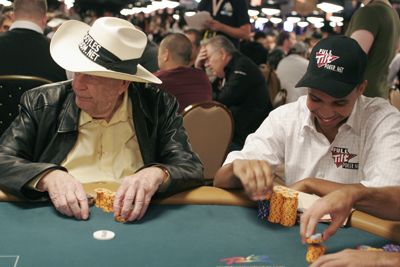
Tom Dwan: I definitely had a lot of times at the table with Doyle and Ivey when they were giving each other shit, and I found that funny. I think one of the last times I saw him, he had played this Poker After Dark thing with like (Texas senator) Ted Cruz, it was like a Sit & Go. I think it was like a $5,000 Sit & Go or something. And he had his scooter thing he was taking to the ARIA poker room and I ran into him on the way and he was just moaning about Hellmuth from a bad beat or something for about two minutes.
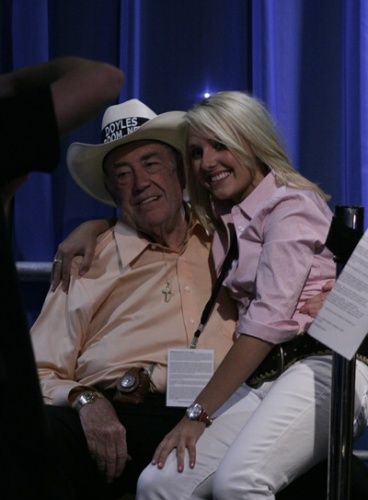
Eli Elezra: His mood was changing from one minute to another. People in our industry, the Daniel Negreanu, the Gus Hansen, are different than the Phil Ivey and the Doyle Brunson (in terms of) trying to help the fan. So when people come to Daniel and me and Gus, we always take pictures, we sign signatures. But Doyle was completely different. (For) one thing, because everybody wanted to take pictures with him. But we went to Foxwoods, we flew private with Chip and Doyle, and he was stuck about $650,000 and Chip Reese kicked me in the leg when he saw an old lady coming and trying to take a picture. “Hello Mr. Brunson, can I please take a picture with you?” He was down about $650,000. He turned around and he said “No picture! Leave me alone!” It’s funny now, but this lady got so scared. So Chip got up after he saw her almost with tears and he said “Hey honey, he’s not (having) a good day today.” But that was Doyle. His mood, he wasn’t always, “Ok, it’s fine,” loser or winner. You could see, like most of us, when we lose you can see the mood change.
Mike Matusow: He was fun to play with. He was so witty. And he hated to lose. He cried like a baby every time he lost a pot. But he had a heart of gold, and I’m still really good friends with his son, Todd.
Brunson On Camera
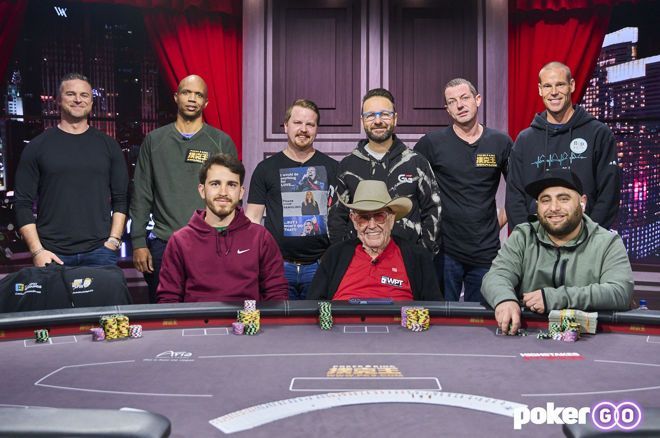
Many casual poker fans knew Brunson through his appearances on High Stakes Poker, The Big Game and other televised cash games. Brunson played for seven consecutive seasons on High Stakes Poker throughout the late 2000s and again in 2022 when the show was rebooted inside the PokerGO Studio.
Mori Eskandani: My favorite memory was behind the scenes of High Stakes Poker. We were filming, staging rather, a boat a against a green screen and everyone had to get one the boat. And then we were going to make it look like they were in the middle of a storm. That’s what high stakes is. And take a photo and all that, superimpose water and everything after that. We were actually blowing water at the end of the fan. This boat was sitting on the platform about ten feet high, and I had a special place set for Doyle because he was on crutches where he would sit and then would make look like he was in the boat, virtually. So he comes in, and everybody was already up there, and he goes, “What are we doing?” I said, “You’re sitting here, I don’t want you to go up the ladder. I don’t think you should go up the ladder.” That’s all I needed to say. “Shouldn’t go up the ladder?” He dropped the crutches, grabbed the ladder and he went up like, I thought he was going to pull the whole thing down. All you had to do was tell him he can’t do something and then, forget it; he would go and do it.
Eli Elezra: We play props, and on High Stakes Poker, I remember talking to Mori and Mori came and said, “We want to do it in Golden Nugget, we want to start the first season.” So Chip told him, “Can we do exactly the same?” He said “Exactly like you have in your game.” And Doyle mentioned the props that we can play. So now we played the props in the first year, and second year, Mori came and said, “No, it’s confusing to mom and pop, they don’t know what we’re talking about.”
Dan Shak: I think I played on High Stakes Poker with him back in the day and a few times in Bobby’s Room, but it’s been a few years.
Mike Matusow: You know, I didn’t play with him that much. I played with him on High Stakes Poker a lot, and he’d whine a lot.
Brunson’s Last Main Event Run
After winning the WSOP Main Event back-to-back years in 1976 and 1977, Brunson finished runner-up in the 1980 Main Event and fourth in the 1982 Main Event. The next year, Brunson made what would be his last Main Event final table appearance and finished third for $108,000.
1983 Main Event champion Tom McEvoy vividly remembers playing with the Godfather of Poker at that final table.
Tom McEvoy: While playing in the Main Event, I had made up my mind and I was a rookie and I was going to kind of sneak up on everybody. I’d won the limit hold’em the week before I won the Main Event, I was still relatively unknown. And I’d won a limit hold’em event up at Amarillo Slim’s Superbowl of Poker in 1982, so I already had one pretty good-sized major win. But I hadn’t played hardly any no-limit Hold’em at this time. You couldn’t play no-limit hold’em around town. But I had played a lot of tournaments, so I had some tournament experience, probably as much as anybody and more even. I loved tournaments and I used to play all these small tournaments around town. That’s how I first met Johnny Chan before he was famous. So I didn’t have much no-limit experience but I had a lot of tournament experience, and that kind of translated. And I made up my mind I wasn’t going to let any of these famous players intimidate me. And every time I thought Doyle Brunson was bluffing me, I came over the top of him. And I was getting away with it. And finally he looked at me, I was sitting right next to him, I had position on him, this was Day 3 of the tournament, he says, “No man alive can do what you’re doing to me and get away with it.” We were still at two tables when he said this, and sure enough, he made a small raise on the button and I’m in the small blind and I get two jacks. So I raise him back, and he calls. And the flop comes kings-queen-small of different suits. So that’s not a very good flop for two jacks, obviously, but that didn’t stop me, I bet out again. Well, he calls me, and we’re not in the money yet, so I know I have to shut down. So I checked the turn that didn’t help anybody. And now he makes a big bet at me (on the river) and I have to throw my hand away. But then he showed me what he’s got: ace-ten. I still had the best hand, he needed a jack for a straight or an ace to draw out on me on the river. And I don’t know that, of course. So he outplays me in this hand. So I tighten up, I’ve got to make sure I make the last table for some money at least. So he successfully outplayed me.
I did survive to the last table, Rod Peate’s got the chip lead, Doyle is second, and I’m a very distant third. Rod Peate had a little over 300,000, Doyle had 250,000 and I’m a distant third with 117,000. But I went on a massive rush on the final day and over three-handed I now have the lead until he loses his final hand where Rod Peate took the lead. And it took a long time, we set a record, like seven and a half hours of heads-up play, and it stood for like 30 years before it got broken.
And of course everybody expected he (Brunson) was going to win when we got down three-handed, but he didn’t. I beat him in a couple pots and then Rod Peate busted him eventually, beat him on a hand with top set. Doyle had top pair and a flush draw, it was jack-nine of diamonds against two nines on a nine-high flop and two diamonds. So Doyle overbet the pot and committed himself and Rod had him covered and he busted him. But what people don’t remember is that that was the last year Doyle Brunson made the final table of the Main Event. Now, he won other bracelets and other things, but that was his last deep run in the Main Event, 1983. And he claims afterwards that he remembered me, and I’m not so sure he really did, but he said he did. He said, “I thought you were straight off the farm.” Well, I’ve never been on a farm, really. But I must have come across as (being from) Hicksville.
“Always At the Top of His Game”
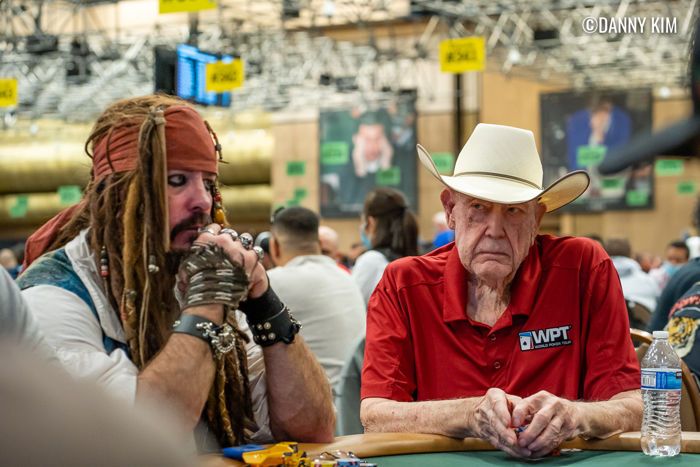
Those who played with Brunson agreed that he was always at or near the top of his game and never far behind the next generation of poker elites.
Tom Dwan: I think I was surprised by how sharp Doyle was, even in new games or when we changed stuff up. And sometimes there were games we would be playing where people had put in a ton of hands online. Obviously, he wouldn’t necessarily be at like the exact top of the game. Sometimes the number of hands is like most important factors, but that said, Doyle was a sharp guy. And I was surprised by that early on. So it was interesting.
Ben Lamb: He played at an elite level for seven decades. I mean, seven fucking decades this guy played at an elite level. And no one’s ever really come close to that. I guess Billy Baxter, he’s up there now and he’s still playing, but Doyle was for sure the Godfather of Poker. He played since his he was in his teens up until his eighties. It had never been done and maybe will never be done again, at the highest stakes at least.
Eli Elezra: During the pandemic, none of go outside the house. So I think for about a year, neither one of us, we were on the phone, and we bet a little sport. That’s another thing Doyle used to do with Chip. They used to bet big on sports, baseball. So I remember sitting and playing with them three-handed, each game of baseball, they have $150,000, $200,000, $250,000 on each game, and I was looking at them, and I said, wow. We were playing three-handed $2,000/$4,000 and the money on sports was a couple of million dollars. So right during the pandemic, we were talking once a week on the phone, and then a year after when the pandemic went away we didn’t want to go to the casino. So we had Richie Klar, he lived next door to him, so Richie said, “Why don’t we play Chinese in my house?” So now we started doing it twice a week at the beginning and then we begin playing three or four times a month later on.
So we drove to Richie’s house, it was me, Eric Wasserson, Jennifer (Harman), John Monette and Doyle, and a couple other people joined us once in a while. And we were just going and it was so funny because it was the same Doyle. We played about a year and a half or two years in Richie’s place a few times a month, and then in the end, literally like two and a half weeks before (he died), I went again. And the last few times when he showed up, Richie went to get him and he literally had to help him from the car because he came on his crutches to the chair. Because his body betrayed him, but his fucking head was there. So he sat down and immediately started the old Doyle moaning when he lose a pot, or when he (would) lose a Chinese session and stuff. And I mean, I’ve been laughing all the time. But you know, he was the same Doyle. Bitching, moaning, but he was playing good in the end. So I’m telling people, please God, let me go like him. Very clear in my mind, knows what I know, but the body’s the body. What can you do?
By the way, by the end of it, nobody paid attention to it but I did. We were meeting around 1 o’clock, sometimes noon, sometimes two, and it doesn’t matter what, Doyle used to get up around 10 p.m. First it was midnight, like in 2018 and 2019, and then when we started again it was ten o’clock. And then the time went down to eight o’clock. As we’re getting older, you go down to eight o’clock, you know? So he always, it doesn’t matter winning, losing, he always got up. He plays 13 hours and he got up. That’s what I learned from him, by the way. These days I’m playing until midnight.
Dan Shak: (I was) just shocked at the energy he had to play long sessions regardless of how old he was or how much he played. He’s like a true Iron Man.
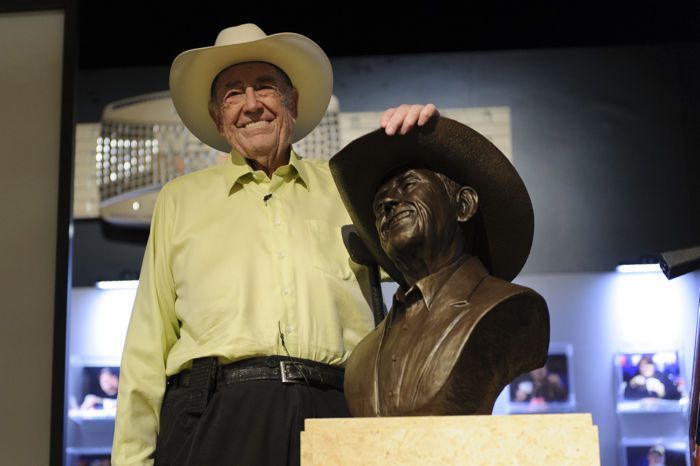
Andy Bloch: There are other longtime pros that I’ve played against when they were much older, and it seems like their skillset dropped off a lot, whether it’s just because of age or substance abuse or that their skills had not kept up with the times. But Doyle was not one of those. He was always at the top of his game, and I don’t think that the new style of poker players had too much of an edge on him, the game theory players. While it certainly helped them catch up to his level of experience, Doyle was still competitive.
Eli Elezra: I played with him in Bobby’s Room, I would say 2022 sometime during the World Series. Right there in Bobby’s Room, he also started playing the props again, and you know, those props is not easy. You’re playing ten props of three sessions each and you have to remember a lot of things. And I’ll tell you what, he hardly slipped a prop. Basically, if you slip a prop you lose money. So it’s unbelievable how good he was. And I count as one of the best in props out there. Doyle used to take a piece of me. He said, “Let’s play.” Props can cost you, $200,000, $300,000 a session. And he used to take a piece of me because he know that I don’t slip. And he never slipped them. He played with me in 2022, he played props with us like the old days. So yes, his mind was very sharp all the way to the end.
Jennifer Harman: It was freaking tough (when Brunson passed). You know, he’s a true legend of poker. And it’s amazing that he was able to play poker throughout his entire life, and he probably saw every era in poker except for maybe when Wild Bill Hickok got killed. But I think that he saw people killed at the tables, that kind of stuff all the way into poker being respectful and a great profession. He had a lot of stories and he put a lot down in his autobiography, so at least that’s out there to remember him by. So that’s pretty special.
Truly the Godfather of Poker
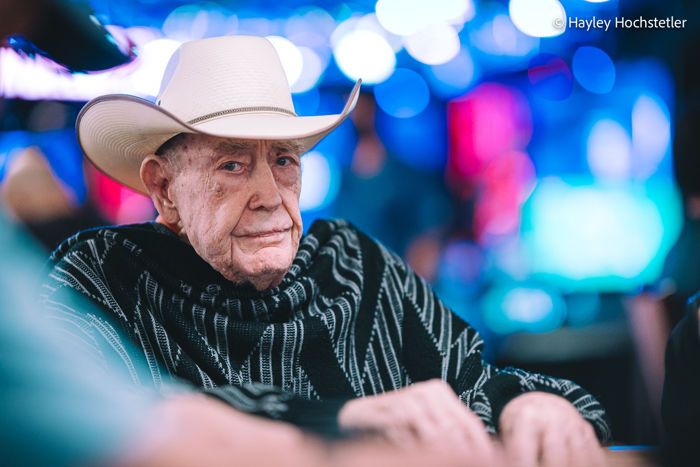
Mori Eskandani: You can reach a certain level of poker, the rest of it is what you are built out of. His DNA, whatever you want to call it. If you asked him, he’d say you have to have a screw loose to be as good as any of these world-class players. But he was just built that way. You can’t train to get there, you can’t teach somebody to get there. If they have it, they have it. And Doyle had it.
Tom McEvoy: He was already the biggest name in poker by the time I moved down to Vegas. And remains it. I always felt he was the number one guy in the poker world. He truly was the Godfather of Poker. He can’t be replaced in the poker world. He had a unique place in it. I always called him one of the Big Three, I think he’s still number one, the big three being himself, Phil Hellmuth and Daniel Negreanu. Ivey, who doesn’t have the publicity as much as the others, is probably number four, in my opinion. But anyway, you can’t replace Doyle Brunson. He was a living legend.
He was a fabulous player. He could’ve won more bracelets if he had focused on that. Don’t forget in the early days when it was smaller fields, he was certainly the best no-limit player at the time. He wasn’t trying for bracelets. All the big money in the early days at the World Series was in the cash games. Even so, Doyle won ten bracelets and he could’ve won more if he focused on that.
Dan Shak: I think he came around at the right time, he obviously had results to speak for him, and he had longevity. You know, he was around before most people even knew about poker, obviously. His books were really, really big. Super/System is still probably the biggest poker how-to there is.
Eli Elezra: A lot of us work with a gut feeling. I still call it, the old school people, we don’t have the GTO and the solvers and stuff. We play more with our gut. And I think that Doyle is the only one that basically, from us (old school players), that decided that poker was getting so big and he’s going to put it in writing, and that’s when he wrote his Super/System. He basically took, in his eyes, the best people and then he asked them to write the sessions. So the difference is that he decided to put it in writing for the next generation. And I don’t know if the beginning was the idea to make money, but you know and I know that you cannot make money from a book. Maybe he did compared to a lot of other people, but that’s the difference. Doyle decided to go ahead and put it all in a book. And that’s why he was so special.
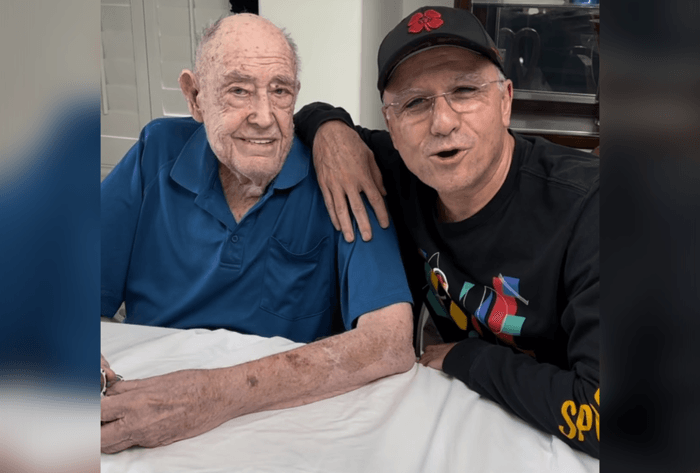
On top of it, he came with his old school (background) where they go from house to house. So Doyle had been there. It’s not like me, you cannot point on me, I’ve never been on the road playing private poker games and being held by a gun and playing with the weirdest people or the biggest, toughest people or the mobsters. Doyle had it all. He started it there, he started on the road. And he was educated, he finished university and he proved it when he wrote the book, how good he is writing the books. So I think that’s the difference between him and Chip, for example. Chip had it, but Chip was playing, like me. We were playing only.
